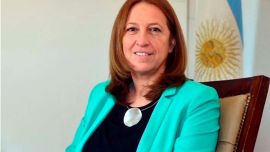The International Monetary Fund is aiming to make a decision on whether to ease billions of dollars in loan fees, which have been criticised as unjustly punitive on borrower countries, before its annual gathering in Washington next month.
The IMF’s executive board plans to hold an informal meeting on the so-called surcharges review, which it announced in April, on Monday afternoon in Washington, according to people familiar with the plan, who asked not to be identified without permission to speak publicly. The United States, the IMF’s biggest shareholder, has signalled a willingness to consider relief.
Board members — 24 directors from the fund’s member countries plus Managing Director Kristalina Georgieva — plan to discuss the issue after they held a question-and-answer session with staff regarding the policy last Wednesday, the people added. The fund said in April that “a number” of directors were open to reviewing the policy, with any change requiring 70 percent of votes.
Following these two meetings, the goal is to have a decision on whether to reduce the fees before the IMF and World Bank annual meetings the week of October 21, they said.
An IMF spokesperson declined to comment on the timing for the surcharge review completion.
The surcharges have become a top target for criticism by progressives, from Democrats in the US Congress to Brazil President Luiz Inácio Lula da Silva, this year’s host of the Group of 20. They argue that the interest rate, which has soared in recent years and is now above eight percent on some loans, creates a heavy burden for countries that are turning to the fund precisely because they’re suffering financial distress.
The burden, which has topped about US$6 billion, is being carried mainly by a handful of countries, notably its biggest borrowers such as Argentina, Egypt, Ukraine and Ecuador, according to IMF data compiled by the Center for Economic and Policy Research, a progressive think tank that supports surcharge relief.
Advocates of relief say that the fees are exorbitant and deprive countries of precious resources needed for social spending on their citizens such as hospitals, schools and pensions. Economists including Joseph Stiglitz, a Nobel Prize winner and professor at Columbia University, called for the elimination of the surcharges in an article published Monday, saying they account for the largest source of net revenue for the fund.
“These surcharges must be eliminated or, at the very least, adjusted to reduce the excessive burden on highly indebted countries,” they wrote. Top US Treasury Department official Jay Shambaugh said in a speech last September that the Joe Biden administration was open to new approaches that help countries while protecting the IMF’s balance sheet and incentivising repayment.
Higher global interest rates since 2022, particularly from the US Federal Reserve and European Central Bank, mean that the total rate on some loans is more than double the level before the Covid-19 pandemic.
The IMF’s review “may result in changes to the policy,” spokeswoman Julie Kozack said Thursday in a briefing on Thursday, adding that any change would need to consider the IMF’s “credit risk management framework.”
“The review aims ultimately to ensure that the IMF can continue to provide financing at affordable rates to the members who need our support,” she said.
The fees apply to nations that borrow more than their allotted share or take longer to repay loans. The Washington-based fund has imposed the fees as a way to discourage its biggest borrowers from becoming too reliant on the crisis lender. The money has long gone to filling up the fund’s precautionary balances, the money it keeps in store to protect against possible losses.
But the IMF already hit its target of US$33 billion (25 billion SDR) in precautionary balances earlier this year, ahead of schedule, leading some analysts to say that it has room to provide relief on the fees that it collects.
More than 20 nations currently pay surcharges, up from eight in 2019, as the economic and political risks of the post-pandemic world have pushed the IMF’s lending to a near-record above US$150 billion to almost 100 countries. Fund data compiled by the Center for Economic and Policy Research show that the fees are being paid by 40 percent of nations that need to repay the fund in the next five years.
The fund charges a rate of 200 basis points on loans above 187.5 percent of a country’s “quota” of IMF financing. That rises to 300 basis points if the loan remains above that threshold after three years, according to the IMF’s website. That’s on top of the IMF’s basic rate, which currently totals about 500 basis points.
related news
by Jorgelina do Rosario & Eric Martin, Bloomberg























Comments